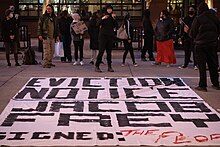Right to housing

| Part of a series on |
| Living spaces |
|---|
 |
The right to housing (occasionally right to shelter
The UN Human Settlement Programme which promotes the right to housing in cooperation with the Office of the High Commissioner for Human Right is a reaffirmation of the 1996 Istanbul agreement and Habitat Agenda. It is known as UN-HABITAT, which is tasked with promoting housing rights through monitoring systems and awareness campaigns.[2]
The section 26, chapter Two of the South African constitution establishes that ''everyone has the right to have access to adequate housing'' and it is the task of the Department of Human Settlement to implement this mandate. In United States, most states do not grant the right to shelter except in Massachusetts where just families have right to shelter. The 1999 constitution of Nigeria recognized the right to housing specifically in the section 43 which states: ''every citizen of Nigeria shall have the right to acquire and own immovable property anywhere in Nigeria''.[4]
Definition


The right to housing is recognized in a number of international human rights instruments. Article 25 of the Universal Declaration of Human Rights recognizes the right to housing as part of the right to an adequate standard of living.[2]
It states that:
Everyone has the right to a standard of living adequate for the health and well-being of himself and of his family, including food, clothing, housing and medical care and necessary social services, and the right to security in the event of unemployment, sickness, disability, widowhood, old age or other lack of livelihood in circumstances beyond his control.

Article 11(1) of the International Covenant on Economic, Social and Cultural Rights (ICESCR) also guarantees the right to housing as part of the right to an adequate standard of living.[2]
In
UN Habitat

The right to adequate housing was a key issue at the 1996 Habitat meeting in
Implementations
This section needs expansion. You can help by adding to it. (January 2019) |
South Africa
One of the seven focus areas by the South African human right is The Right to Adequate House and this is beyond the mere provision of building materials.
The rights such as the right to public participation, equality, human dignity, and access to information are amongst the cross cutting rights linked with right to adequate housing as noted by the Constitutional Court in Government of the Republic of South Africa and Others v Grootboom and Others 2001 (1) SA 46 (CC)[8]
In South Africa, section 26 of Chapter Two of the Constitution establishes that "everyone has the right to have access to adequate housing". The Department of Human Settlements is tasked with implementing this mandate. Based on recent data, around 3.6 million South Africans still live in shacks or informal settlements (2013 data),[9] while it is estimated that around 200,000 are homeless or living on the streets (2015 data).[10]
Based on a survey of human rights experts administered by the Human Rights Measurement Initiative in 2019, South Africa is doing only 69.6% of what should be possible at its level of income on the right to housing.[11]
United States

Most
Nigeria
The right to housing is recognized in the 1999
The housing conditions of people in Nigeria falls short of the international human rights law and standards, particularly vulnerable groups such as women,
Based on a survey of human rights experts administered by the Human Rights Measurement Initiative in 2019, Nigeria is doing only 35.5% of what should be possible at its level of income on the right to housing.[17]
See also
- Civil Rights Act of 1968 – U.S. legislation which includes the Fair Housing Act
- Housing Benefit
- Housing estate
- Housing First
- Housing gap
- Public housing
- Section 8
- Subsidized housing
References
- JSTOR 43953319.
- ^ ISBN 978-1-86134-482-3.
- ^ a b The right to adequate housing (Art.11 (1)). CESCR General comment 4 – see para. 8
- ^ a b c "Fundamental Right To Property And Right To Housing In Nigeria – A Discourse". ResearchGate. Retrieved 2022-03-05.
- ISSN 1659-4304. Retrieved December 20, 2014.
- ^ The Yogyakarta Principles, Principle 15. The Right to Adequate Housing
- ^ ACHR decision in case SERAC v. Nigeria – see para. 60 (p. 25) Archived 2012-02-20 at the Wayback Machine
- ^ "Legal case in South Africa". Researchgate.
- ^ http://www.thehda.co.za/uploads/files/HDA_South_Africa_Report_lr.pdf [bare URL PDF]
- ^ "Homelessness in South Africa". wp.wpi.edu. Retrieved 2019-06-19.
- ^ "Quality of Life Overview - South Africa". Rights Tracker. Human Rights Measurement Initiative. Retrieved 4 May 2023.
- ^ ""Right to Shelter" in Massachusetts". 18 December 2014.
- ^ A Handbook on California's "Right to Shelter Law"
- ^ "Opinion | A Right to Shelter in New York (Published 2016)". The New York Times. Archived from the original on 2023-04-30.
- ^ – via Researchgate.
- ^ a b c "OHCHR | Visit to the Republic of Nigeria by Ms. Leilani Farha, Special Rapporteur on adequate housing as a component of the right to an adequate standard of living, and on the right to non-discrimination in this context". www.ohchr.org. Retrieved 2022-03-05.
- ^ "Quality of Life Overview - Nigeria". Rights Tracker. Human Rights Measurement Initiative. Retrieved 4 May 2023.
External links
- Special Rapporteur on adequate housing as a component of the right to an adequate standard of living, UN
- International standards of the right to housing
- Housing Rights Legislation: Review of International and National Legal Instruments
- CESCR General comments:
- Factsheet on right to housing, UN
- CoE Commissioner for Human Rights:
- Interpretation and application of Article 31 of RESC//Digest of the Case Law of the European Committee on Social Rights, 2008. pp. 169–173, 349—355
- Right to Housing Geneva: CETIM, 2007.
- Housing is a human right: How Finland is eradicating homelessness. Canadian Broadcasting Corporation (CBC). Published 24 January 2020.
